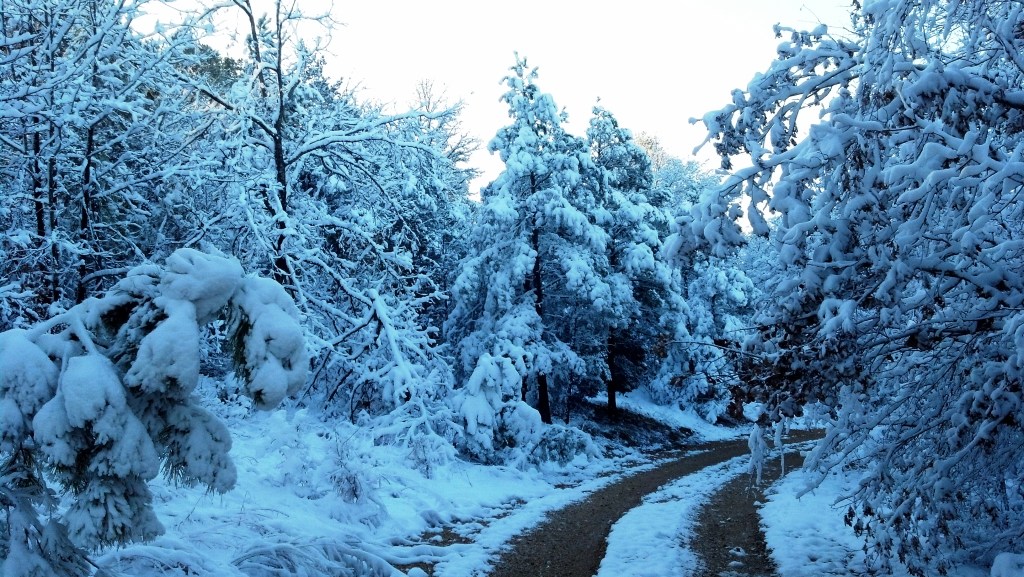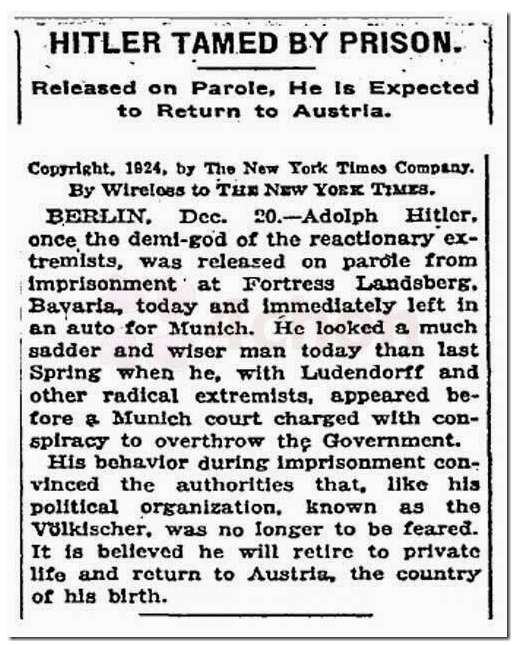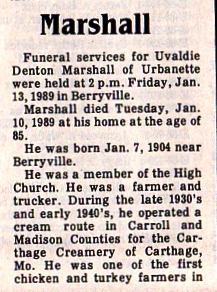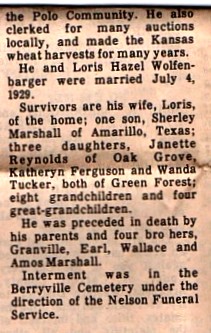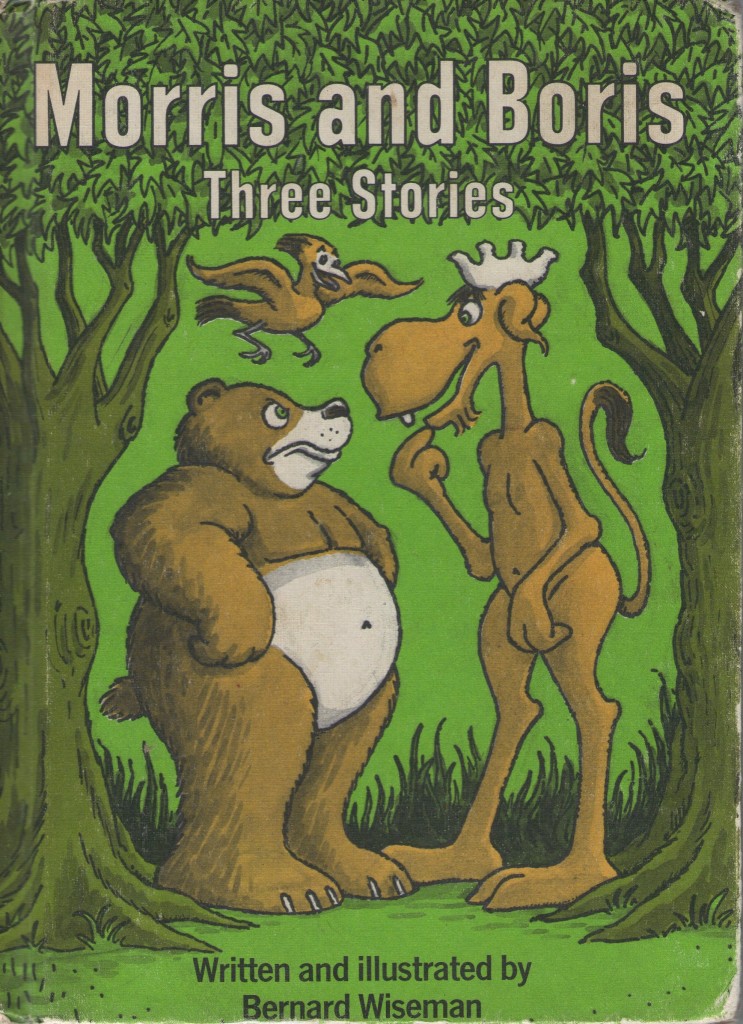Monthly Archives: March 2014
1924 New York Times Article on Hitler
Eureka Springs Independent Newspaper Column for March 12, 2014
Usually I read old issues of the Eureka Springs Times-Echo to get a glimpse of our town’s past and generally I write about events from before my birth. This week is different, as March 5, 1985, doesn’t seem all that long ago.
And it isn’t the Times-Echo I have spread before me, but the inaugural issue of the Eureka & North Arkansas Journal, published and edited by Mary Stockslager. It says a group of spectators applauded when Jim Abbott hung the Journal sign above the door to the newspaper’s offices at the junction of Spring and Main. Other newspaper staff listed are Business Manager Bob Holley and Office Manager Jolene Dunn.
The first letters to the editor are all of a congratulatory nature. Those wishing the Eureka & North Arkansas Journal the best of luck are Mayor Don Thurman, John F. Cross, Thomas H. Dees, Rex A. Gustin, Dave Drennon and Bob Purvis. Wheeler Printing has a big ad in the newspaper giving congratulations, also.
In political news, Jerry Ferguson, Ken Smith, Jack Tuttle and Pat Thurman were running for positions on the Eureka Springs School Board.
At the city council meeting, Louise Mesa presented a proposal on how to “combat the city-wide problem of trash” to Aldermen Chris Bonewitz, Bill Featherstone, Sam Reeves, Al Westphal, Randy Wolfinbarger and David Zimmermann.
Nearby in the town of Beaver, the Arkansas Department of Pollution Control and Ecology was investigating possible gasoline in five wells and in the Beaver Spring. According to long-time resident Dewey French, it had been a problem since 1973.
More than anything else, it is the advertisements in the Eureka & North Arkansas Journal that transport me back to my youth. Tastee Freeze was taking applications and the Eureka Flower Shop was located back at 67 Kingshighway. Builders Supply, Greenlee Pearson Funeral Home and E & E Steakhouse were all still in business.
I remember reading the Eureka & North Arkansas Journal while in high school, but it must have ceased publication while I was away. If you know what happened, please tell me at steve@steveweems.com or P.O. Box 43 in Eureka Springs.
The Right Honorable Henry McLeish
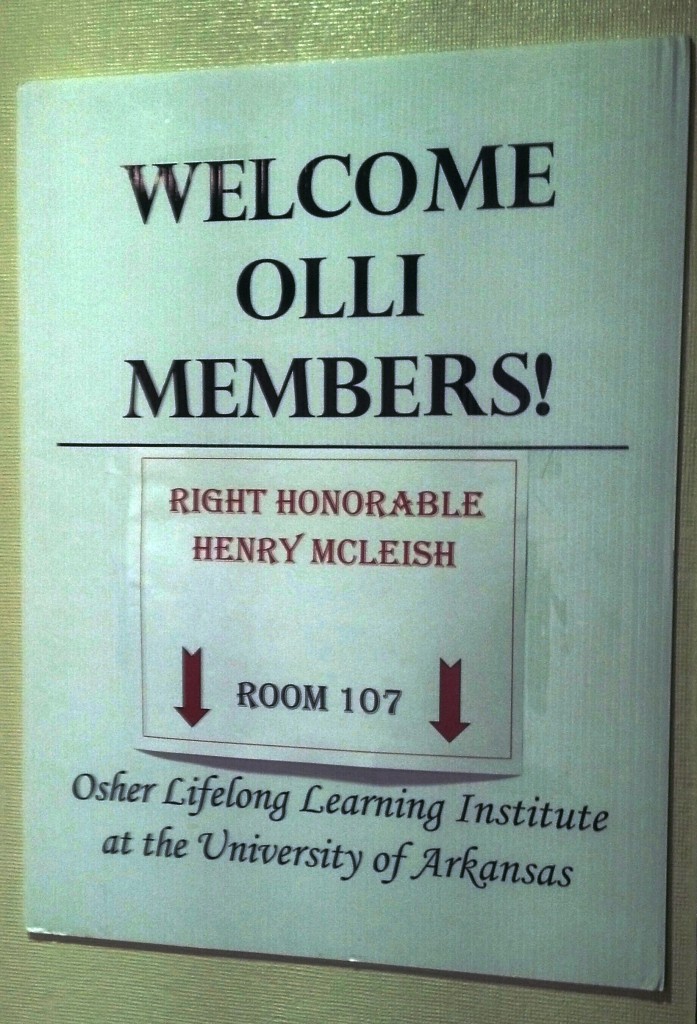 Yesterday I had the great fortune to hear the Right Honorable Henry McLeish speak before a small crowd at the University of Arkansas in Fayetteville. He gave some prepared remarks on education, mostly dealing with the importance of continuing education for seniors such as that available at the Osher Lifelong Learning Institute and then answered questions from the audience. I was as impressed as I expected to be with his thoughtful and often entertaining answers. I would have liked to have peppered him with queries regarding his hometown of Methil in Scotland and then warmed up into questions on the old Kingdom of Fife regarding politics, coal mining, poverty and the class system. But I didn’t. Instead he answered the predictable questions on Scottish independence (he said it will fail this time around) and a few odds and ends (such as the cost of the new airport tram system in Edinburgh and the shrinking British military.) After I left I realized I should have asked for his autograph but when I returned the small auditorium was locked.
Yesterday I had the great fortune to hear the Right Honorable Henry McLeish speak before a small crowd at the University of Arkansas in Fayetteville. He gave some prepared remarks on education, mostly dealing with the importance of continuing education for seniors such as that available at the Osher Lifelong Learning Institute and then answered questions from the audience. I was as impressed as I expected to be with his thoughtful and often entertaining answers. I would have liked to have peppered him with queries regarding his hometown of Methil in Scotland and then warmed up into questions on the old Kingdom of Fife regarding politics, coal mining, poverty and the class system. But I didn’t. Instead he answered the predictable questions on Scottish independence (he said it will fail this time around) and a few odds and ends (such as the cost of the new airport tram system in Edinburgh and the shrinking British military.) After I left I realized I should have asked for his autograph but when I returned the small auditorium was locked.
I’ve followed the career of Henry McLeish from afar since probably the middle 1990s, or whenever the internet made it possible for me to do so. What captured my interest, of course, was that he was the Member of Parliament for Central Fife in Scotland and a rising star in British politics. He was a Minister of State for Scotland in the Blair government and key in the devolution process that led to the creation of the Scottish Parliament. Among the many accomplishments on his impressive resume is that he served as the First Minister of Scotland (similar to being the Prime Minister of Scotland.) Now he lectures at various universities besides being a consultant on all things Scottish wherever he goes. He was interviewed by National Public Radio yesterday, for instance, and his opinion is continually sought by the BBC and other media.
I suppose I felt disappointed by the whole thing in a way, though. There were only about thirty in attendance and I don’t think the majority really grasped that they were hearing a First Minister of Scotland. I’m not saying they weren’t appreciative of his enjoyable talk, but he’d been instrumental in devolution, after all. I don’t know what would have been appropriate to the occasion and I generally prefer things to be low key, but standing room only and television crews would have been nice. I felt it to be a real honor to be in the same room. I bet if he toured the various Scottish festivals in the United States and Canada he’d be treated like a rock star.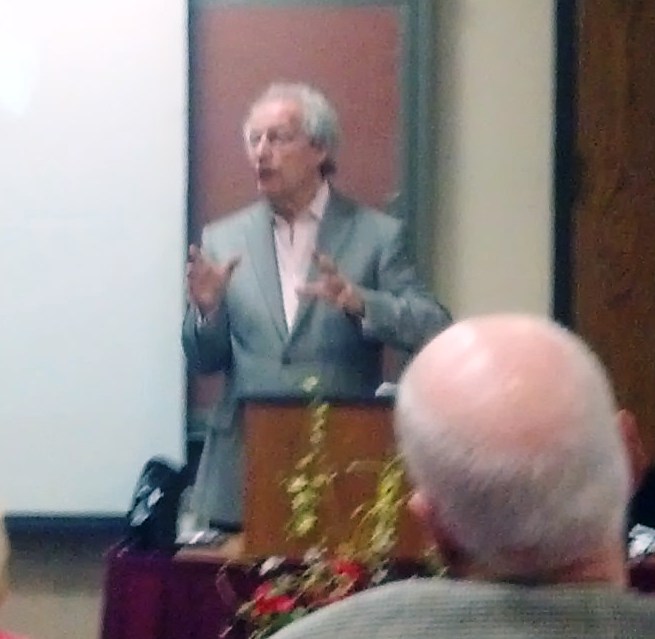
Uvaldie Denton Marshall Obituary
Eureka Springs Independent Newspaper Column for March 5, 2014
The house that McKinley Weems was born in no longer exists. It was sold, torn down and replaced with the Statue Road Inn. Now that location is called Passion Play Road, but at the time of McKinley’s birth it was Magnetic Hollow Road. It would be another 45 years before Gerald L. K. Smith came to town and started shaking things up.
In the 1920s, most of the traffic on Magnetic Hollow Road was horse drawn log wagons slowly hauling railroad ties from sawmills in the woods to the railroad on Main Street. The drivers of these wagons often dozed as the horses knew the way. About twice a week there would be the excitement of an automobile coming down the road.
This was the same timeframe as “Lucky Lindy” flying a single engine airplane from Long Island, New York, to Paris, France, and young McKinley’s imagination was aflame with the possibilities of flying machines. He wanted to fly.
McKinley would walk up the long hollow that drained water from the direction of the Odd Fellows Cemetery and go up under the bluff and capture brooding buzzards. He’d carry the vultures (which will cause them to vomit) into the open and release them, just to see them take off and fly like an airplane.
In 1930, a big airplane fly-in was organized to celebrate Independence Day in Eureka Springs. About a hundred biplanes landed at the airport on Onyx Cave Road and rides were offered at $1 per flight. Young Mac wanted to walk over and see the planes, but his father refused to let him go. I asked, “Why?” and McKinley shrugged and said, “It was the horse and buggy days.”
He had to content himself with watching from a distance, sitting in the top of a tall tree on Magnetic Hollow Road watching biplanes clear the forest after takeoff or coming in low to land.
Beginning in 1952, McKinley’s dream of flying was realized when he piloted a Piper Cub over Eureka Springs, dipping down to glance in the top windows of the Basin Park Hotel before going to take a look at Beaver. He flew for many years thereafter.

